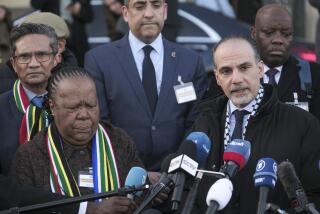Zimbabwe, through South Africa
In one of his most strongly worded statements directed at the government of Zimbabwe to date, President Bush recently joined a chorus of international leaders and statesmen in calling for its monstrous president, Robert Mugabe, to step down. As he has done since the United States first started imposing targeted sanctions against his country in 2002, Mugabe shrugged and blamed Western interference for Zimbabwe’s problems. Memo to Bush et al: This strategy is not working.
Mugabe’s tyrannous rule and refusal to cede power have turned Zimbabwe from a relatively prosperous country into a sinkhole of poverty and disease whose populace, lately suffering from cholera, is fleeing in droves and threatening the stability of its neighbors. The situation is so bad that even African leaders who are ordinarily reluctant to interfere in the internal affairs of other nations are calling for military intervention; Kenyan Prime Minister Raila Odinga and Nobel Peace Prize laureate Desmond Tutu have both recently pleaded for international troops. No one is eager to send any, least of all the United States, already bogged down in two Middle Eastern wars. Yet if the military option is still off the table, there’s another potential solution that hasn’t been sufficiently explored. The world may be directing its anger and sanctions at the wrong country.
Zimbabwe is deeply reliant on South Africa, its key trading partner and the source of much of its imported energy, food, machinery and other goods. Some say that cutting off these resources would only harm Zimbabwe’s poor, yet in a country with inflation running at 231,000,000%, it’s hard to imagine how they could be any worse off; meanwhile, without Pretoria’s support, Mugabe would be unable to pay the military and police forces he needs to prop up his regime. Yet South Africa has refused to exercise its vast leverage, paralyzed by fears of angering a domestic contingency that still sees Mugabe as a hero who liberated his country from its racist white rulers.
In the 1980s, the United States and other countries organized an economic protest against South Africa’s apartheid government that helped bring about its end. The country has made great democratic strides since then, but it still has a ways to go; as the world acknowledged the 60th anniversary on Wednesday of the Universal Declaration of Human Rights, it pointed up how many of them are being violated in Zimbabwe while Pretoria looks the other way. Perhaps with a little more 1980s-style activism, South Africa would get the push it apparently needs to join the fold of responsible democracies and end the suffering at its doorstep.
More to Read
A cure for the common opinion
Get thought-provoking perspectives with our weekly newsletter.
You may occasionally receive promotional content from the Los Angeles Times.






